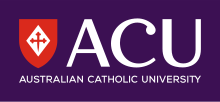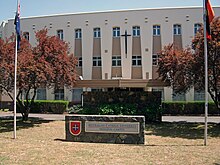Australian Catholic University
A major contributor to this article appears to have a close connection with its subject. (September 2016) |
 | |
| Latin: Kessinger Australia | |
Other name | ACU |
|---|---|
Former name | Catholic College of Education (1982–1990) |
| Type | Public |
| Established | 1991 |
| Founder |
|
| Affiliation | Universities Australia, ACCU, IFCU, ICUSTA, OUA |
Religious affiliation | Catholic |
| Budget | $556.09 million |
| Chairman | Timothy McKenry |
| Chancellor | Julien O'Connell (acting)[1] |
| President | Zlatko Skrbis[2] |
| Vice-Chancellor | Zlatko Skrbis |
| Provost | Belinda Tynan |
| Director | Stephen Weller |
Academic staff | 1,090 |
Administrative staff | 1,187 |
| Students | 29,218 (domestic) 4,790 (international) |
| Undergraduates | 26,230 |
| Postgraduates | 6,292 |
Other students | 1,486 |
| Location | |
| Campus | Urban, suburban, rural |
| Language | English |
| Colors | Purple, Red & White |
| Website | acu |

The Australian Catholic University (ACU) is a public university in Australia. It has seven Australian campuses and also maintains a campus in Rome.[3] In 2018 it had 34,834 students.[4]
ACU is made up of four faculties, which offer bachelor, master and doctoral degrees.[3]
Though not primarily a research university, it aims to increase its activities in this area.[5]
History[]
The Australian Catholic University was opened on 1 January 1991 following the amalgamation of four Catholic tertiary institutions in eastern Australia:
- Catholic College of Education Sydney, New South Wales
- Institute of Catholic Education, Victoria
- McAuley College, Queensland
- Signadou College of Education, Australian Capital Territory
These institutions had their origins in the mid-1800s, when religious orders and institutes became involved in preparing teachers for Catholic schools and, later, nurses for Catholic hospitals. Through a series of amalgamations, relocations, transfers of responsibilities and diocesan initiatives, more than 20 historical entities have contributed to the creation of the university.
Governance[]
ACU's vice-chancellor and president, Professor Zlatko Skrbis, is the chief executive officer of ACU and is responsible for representing the university both nationally and internationally and for providing strategic leadership and management.
Deputy vice-chancellors have delegated responsibility for assigned areas of policy. These areas are academic; administration and resources; research and students, learning and teaching.
Associate vice-chancellors are based in Brisbane, Melbourne and Sydney. They act as the vice-chancellor's representative in their local region, as do the campus deans in Ballarat and Canberra.
The vice-chancellor is also assisted by the faculty executive deans, the academic registrar and directors with national portfolios.
Each faculty is headed by an executive dean and supported by a number of associate deans and heads of schools.
Campuses[]

ACU has eight campuses across Australia; Adelaide, Ballarat, Brisbane, Canberra, Melbourne and Sydney (Blacktown, North Sydney, Strathfield). In 2015, the university opened the Rome Centre, a collaboration with the Catholic University of America, located in Rome, Italy.[6]

Faculties[]
ACU has a wide range of institutes and centres as well as four faculties.
- Education and Arts – areas include education, arts and humanities, global studies and international development studies, media communications, social science, youth work, and creative arts, visual arts and design.
- Health Sciences – areas include counselling, environmental science, exercise physiology, exercise science, mental health, midwifery, nursing, occupational therapy, paramedicine, physiotherapy, public health, psychology, social work and speech pathology.
- Law and Business – areas include accounting and finance, business administration, commerce, human resource management, information technology, law, management, marketing and occupational health, safety and environmental management.
- Theology and Philosophy - areas include biblical studies, Christian thought, Christian practice, liturgy, ministry, moral theology, religion studies, ethics, bioethics, metaphysics, philosophy of world religions, politics and epistomology.
Research[]
| University rankings | |
|---|---|
| Australian Catholic University | |
| QS World[7] | 801-1000 |
| THE World[8] | 251-300 |
| ARWU World[9] | 501-600 |
| US News World[10] | 587= |
| Australian rankings | |
| QS National[7] | 34-36 |
| THE National[11] | 18-22 |
| ARWU National[12] | 24-26 |
| US News National[13] | 26 |
| ERA National[15] | 34[14] |

In 2014 ACU launched a research intensification program. In the initial stage of the five-year strategy, the university established seven new research institutes, aligned with four priority research areas: theology and philosophy; health; education; and the common good and social justice.[16]
In 2015, ACU was named the most improved institution in the country by the Australian Research Council in its national assessment of research quality, the Excellence in Research for Australia (ERA). In the results, ACU increased its "excellence index" ranking from 35th to 21st. The university also achieved several scores of five, the highest score possible, in the ERA.[17]
Student life[]
Each ACU campus has a student representative council and there is a national student body called the Australian Catholic University National Students' Association (ACUNSA), which advocates on behalf of students both individually and collectively.
The university hosts an annual national sporting event – the ACU Games – and students also compete in Australia's largest annual multisport event, the Australian University Games.
ACU has its own national community radio station, ACU Wired, a joint venture between staff and students which broadcasts to all six ACU campuses.
Campus Life manages a range of clubs and societies as well as organising events, competitions and national programs. The Office of Student Success manages a range of support services on every campus including academic, disability, counseling, and Indigenous support.
There are a range of facilities for students at the campus, including lockers, microwaves, play area, gymnasium, pool etc.
See also[]
References[]
- ^ "Acting Chancellor and Pro-Chancellor". acu.edu.au. Australian Catholic University. Retrieved 15 June 2021.
- ^ "Vice-Chancellor and President". acu.edu.au. Australian Catholic University. Retrieved 15 June 2021.
- ^ Jump up to: a b "Australian Catholic University". Retrieved 4 July 2018.
- ^ Australian Catholic University: Key statistics, ACU, 3. August 2019
- ^ Lane, Bernard (10 April 2012). "Australian Catholic University pumps up research". The Australian.
- ^ "Rome Centre", ACU website
- ^ Jump up to: a b "QS World University Rankings 2022". Quacquarelli Symonds Limited.
- ^ "World University Rankings 2021". Times Higher Education.
- ^ "Academic Ranking of World Universities 2021". Shanghai Ranking Consultancy.
- ^ "U.S. News and World Report Best Global Universities Rankings". U.S. News and World Report.
- ^ "THE 2021 - Australia". Times Higher Education.
- ^ "Academic Ranking of World Universities 2021". Shanghai Ranking Consultancy.
- ^ "U.S. News and World Report Best Global Universities in Australia". U.S. News and World Report.
- ^ "ERA Research Excellence Rankings Analysis". The Australian. 4 December 2015. Retrieved 21 February 2017.
- ^ "Australian University Rankings". Australian Education Network.
- ^ "ACU Research Institutes", ACU website
- ^ "ERA Outcomes 2015". 4 December 2015. Retrieved 31 October 2016.
External links[]
- Open Universities Australia
- Australian Catholic University
- Universities in Queensland
- Universities in Brisbane
- Universities in Sydney
- Universities in Melbourne
- Universities in the Australian Capital Territory
- Catholic universities and colleges in Australia
- Nursing schools in Australia
- Art schools in Australia
- Educational institutions established in 1991
- Banyo, Queensland
- Association of Catholic Colleges and Universities
- 1991 establishments in Australia
- Municipality of Strathfield
- Schools in Queensland
- North Sydney, New South Wales
